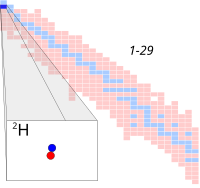
Photo from wikipedia
Singlet fission is a photophysical process in which two triplet excitons are produced from one singlet exciton. Understanding the details of this process, especially the properties of intermediates between singlet… Click to show full abstract
Singlet fission is a photophysical process in which two triplet excitons are produced from one singlet exciton. Understanding the details of this process, especially the properties of intermediates between singlet excitons and free triplet excitons, is particularly important to its optimization and application. Herein, we explore the bound triplet pair, m(T1T1), an important intermediate state in singlet fission. We highlight a growing number of studies indicating there is an energetic stabilization of triplet-pair states relative to free triplets. This stabilization enables endothermic singlet fission processes and often results in long lifetimes of the bound triplet-pair state. However, triplets in close proximity demonstrate heightened recombination and reduced excited-state lifetimes. The ubiquity of bound triplet-pair states in recent reports indicates the importance of this state, the need to discern it from free triplets, and the usefulness of having carefully tuned interactions between triplets produced by singlet fission.
Journal Title: Chem
Year Published: 2019
Link to full text (if available)
Share on Social Media: Sign Up to like & get
recommendations!